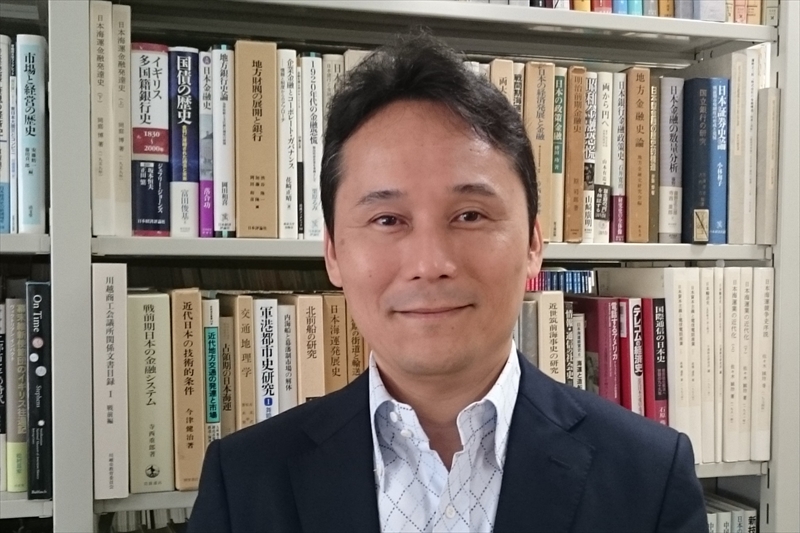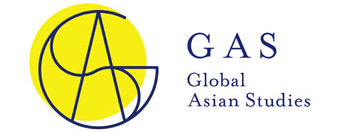An Interview with Professor Nakamura Naofumi of Institute of Social Science, the University of Tokyo
Yijiang Zhong (Institute for Advanced Studies on Asia)

Prof. Nakamura, thank you for agreeing to the interview today on the Global Japan Studies program.
Actually I have been thinking about global studies of Japan since a long time ago. I also wrote an essay called “I and International Japanese Studies.” When I came to the Institute of Social Science (ISS) in 2002, I joined the editing board of the Institute’s English-language journal “Social Science Japanese Journal” and worked as an editor until 2012. Founded in 1998, SSJJ is edited by the ISS and published biannually by Oxford University Press. SSJJ accepts Japan-related academic submissions from all social science disciplines. In correspondence to submissions, the editorial board consists of specialists in law, political science, economics, sociology, history and anthropology. All editorial members participate in the reviewing process so I have had to read papers from outside of my fields of specialization. This was the first time that I read intensively a large quantity of papers written in English and coming from other social science fields despite of the fact that I by then had read mostly papers in economics and history.
I stayed for a year in 2003 at the School of East Asian Studies of the University of Sheffield. There I came to understand the importance of the field of international Japanese Studies in the sense that it can discover from outside what Japanese do not know about Japan. As a result, I started to think about creating some Japan History Group. Upon returning from Sheffield, I worked with Prof Jason Karlin, SSJJ’s managing editor at that time, to create the JHG. JHG participants are basically from outside the ISS but were once affiliated with ISS. This group became the base of JHG and more people were invited to join the group. There are about a hundred members on the JHG mailing list. If SSJJ aims to be an interdisciplinary international Japanese Studies hub in social sciences, JHG is then a research group aspiring to bridge Japanese historical research in Japan and that overseas.
I heard ISS professors speak good foreign languages.
Among all ISS faculty I am probably the one who excel least at foreign languages. Professors here are great. Everybody can speak fluent English, French or Germany. They also write in English. They are at a different level. On the other hand, in terms of study of Japanese history the more international place is probably the Komaba campus (of the University of Tokyo). Prof Mitani Hiroshi there, for example, has been at the forefront of promoting internationalization of Japanese history research although he retired recently. As a result, PhD graduates from Komaba speak English.
The two places where you can get PhD in Japanese history are then Graduate School of Humanities and Sociology (at Hongo campus) and (the Graduate School of Arts and Sciences) at Komaba campus.
Right. You get PhD in literature from Graduate School of Humanities and Sociology and PhD in science (gakujutsu) from Komaba, but they are essentially the same. Besides these two Japanese history PhDs, in the Graduate School of Economics you can earn a PhD in economic history, in the Graduate School of Law and Politics a PhD in political history, and in Graduate School of Education a PhD in educational history. There is also School of Agriculture which confers PhD in agricultural history. At Komaba there is history of science as well. That is, historians are trained at different places of the University of Tokyo and furthermore except for the Graduate School of Humanities and Sociology they are all interested in international Japanese studies. This is different from the U.S. where historical studies is confined within the department of history. In Japan, history is confined similarly but at the same time you can find a variety of setting for study of history. I think this model of diversity is better.
One feature of the University of Tokyo is that it lacks horizontal institutional arrangement. It is difficult to put up posters on campus. So our lectures, even in the case of world-famous speakers, have small audience.
The reason needs to be traced back to the origin of the University of Tokyo. It came into being based on an integration of several universities including schools of medicine, engineer, and agriculture as well as the first high school at Komaba. As such there is a strong sense of vertical division and it has become a kind of tradition. There is little you can do about it. It is up to research institutes such as ISS and IASA (Institute for Advanced Studies on Asia) to play a role of glue bringing together these disparate places. We at ISS indeed think we can function as a connector for the networks of social science specialists in Graduate School of Law and Politics, Graduate School of Economics, Graduate School of Education and to an extent Graduate School of Humanities and Sociology. Most close relationships are with law, politics and economics. In the case of IASA it is Graduate School of Humanities and Sociology and Komaba.
The Global Japan Studies network aims to promote exchanges between Japanese studies in Japan and that overseas. But there are few faculty and students so far interested in English. When students don’t realize the importance of English, I believe it is the responsibility of professors to promote that consciousness.
This is actually happening. The Graduate School of Economics of the University of Tokyo has created programs which require only English. English is now a necessary requirement for graduate students here.
Criteria for judging the quality of research papers changes from one language to another. Problematics change as well. It appears that researches which do not problematize the frame of nation-state itself are no longer sufficient even though the research can be evidentially extremely exquisite and thorough.
Right, different ways in which to define problems. In Japan there is a tendency to rely on somebody else for formulation of the larger framework and focus on investigating evidences within that framework. Those kinds of research are considered good. For Japanese studies specialists in Europe and the U.S., isn’t this kind of research actually easy to use? It would be very difficult for them to dig into archives to retrieve evidences although one can decide on the framework easily. So the papers which discover source materials are very convenient. There is a kind of division of labor between Japanese studies overseas and Japanese studies in Japan. They have different vectors. But now they have to reconcile with each other. This is difficult. When Japanese researchers start to think about their research framework, they will excise source materials according to the need of their framework and their research won’t be useful for second-time use by overseas scholars. In this case, Japanese studies specialists have to go into archives themselves. This is a high, difficult hurdle. I am saying that to unify the criteria of evaluation will cause different kinds of problems. A certain kind of diversity is meaningful for uplifting the overall research level. I always think about this issue when working on international Japanese Studies. For example, where the presenter is from the U.S., I will assign a Japanese discussant. They go well with each other. One side wants to discuss new frameworks while the other is interested in finding new information. They look for what they themselves don’t have in the other and the discussion proceeds smoothly. They don’t conflict and the process is productive.
If Japanese starts to conduct international Japanese studies and I think this will happen, Japanese studies specialists in the U.S. may end up having trouble because they have to find source materials themselves. Similar change is actually happening in the case of Japanese specialists of foreign histories. In the case of French history in Japan, scholars have used skillfully papers and books written by French scholars to arrange these materials with their own perspectives. However, as problematics of French scholars become global, scholarship can’t be constituted by simply ideas anymore. Japanese scholars have to go to France to conduct archival research and analysis just like their French colleagues. This is difficult. In a sense this is the result of the influence of globalization. That is, scholarship will become English based. For example scholarship in German language will be reshaped along English methodological lines. In a way, evidences will be segmented based on Anglo-Saxon ways of thinking and the way in which we have been connecting source materials won’t work anymore. For scholars from other countries, real history that can be found in research papers in Japan will disappear. They have to go find the history themselves. International Japanese studies are part of that change. We need to be cautious of it.
It is important to maintain diversity and complexity of Japanese studies.
One more thing we need to keep in mind: the globalization age will not last forever. While I don’t want to think this way, it may be possible that nationalism will come back at certain point of time. Globalization is accompanied by certain freedom which is good. In this sense we should promote international Japanese Studies. But it is a fact that globalization will not continue endlessly. Ways of things and talking about them then change. In a sense history repeats itself. The status of English in Japan is exactly such a history of repetition.
Today is evidently the age of English but this is actually dangerous. It gives rise to enormous social stratification. People will be divided along the line of whether one can speak English or not. It will engender social conflict and become the symbol of social status formation. English proficiency may divide society.
Thank you today for sharing many comments and opinions. Let me conclude today’s interview. Prof. Nakamura, thank you very much.



